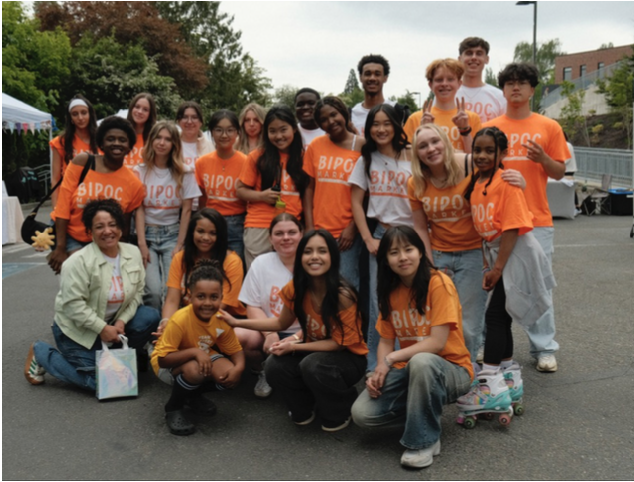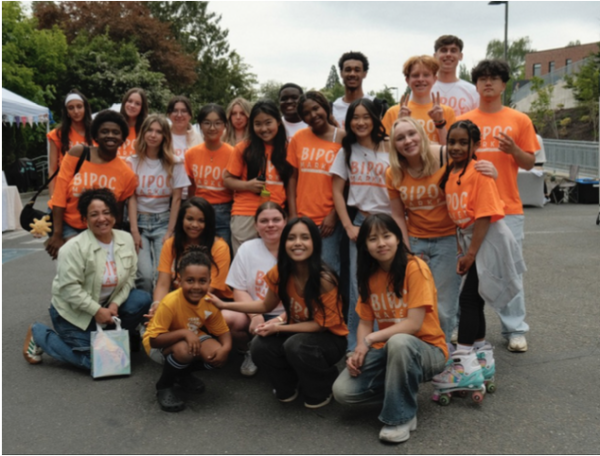Immigration insight from Mexico: a conversation with Mexico’s only female pollster
Mexico’s youngest and only female pollster, Lorena Becerra Mizuno, center in blue jacket, with Annie Wright Upper School Girls’ Business & Entrepreneurship Program in Mexico City. Photo courtesy of Jake Guadnola.
April 14, 2019
Girls’ Business & Entrepreneurship Program students traveled to Mexico City last fall. One of the inspirational women they met was Lorena Becerra Mizuno, the only female and youngest pollster for the only independent newspaper in Mexico, El Reforma. Her position as a pollster makes her uniquely aware and knowledgeable about public opinion and Mexican policies. Inkwell had a conversation with Mizuno about political opinion in Mexico regarding United States’ immigration policies and the current situation at the border in Tijuana. She also shared her views on the future of immigration policy and politics between the neighboring countries.
Inkwell: What are the biggest motivators for people living in Central and South America to immigrate to the United States?
LBM: Throughout time it has been poverty, and in the last few years it has been insecurity – especially in Honduras and Guatemala – the problem with the absence of the rule of law, the prevalence of gangs, and the recruitment of the young for these gangs. People are trying to avoid this kind of violence; they are not able to protect their children from crime, so they are willing to go through the whole journey, through Mexico etc., to get to the United States because they feel they are going to have a better standard of living. The governments in South America, even in Mexico, have been unable to provide institutional certainty, security, and economic certainty for the population. This is what they are needing to leave their hometown to find. In Mexico, when we started immigrating in the beginning it was to make money, because they were trying to send money back to their families, but now it is a matter of life itself.
Inkwell: How are American immigration policies perceived and talked about in Mexico?
LBM: In general, it is sort of like a passive agreement, in the ages even before Obama, that there were some illegal immigrants being allowed into the US. Ever since Obama, deportation started increasing. In general, we are not that clear, in the public opinion in Mexico, on how harsh Obama was in terms of immigration, but he was very harsh and we don’t perceive it that way. We perceive that the harshest immigration policies have been Trump and that Trump has been cruel. We perceive a hatred towards Mexico, blaming Mexico even of things that are not factual like the surge in crime. Here right now we perceive that there is a hostile immigration policy from the United States towards Mexico, specifically with Trump. But in the data, we know that it started with Obama, but it just worsened with Trump because it has been a focus of his electorate.
Inkwell: What are the effects of the United States’ harsher immigration policies on Mexico, specifically regarding the people kept at the Mexican border?
LBM: Mexican immigration towards the United States, the illegal, has tended to go down. We see the deportation data from the United States to Mexico and it has decreased. The people who are there are staying there. Mexico benefits a lot from the remittances; it is up to $30 billion now. For us it is very important for those to keep going, because it is a very important part of our economy. As you know, immigration comes from specific states in Mexico. These are very poor states, so the remittances are very important for the livelihood of these states and for the general national economy. So when we talk about how it is affecting the economy in terms of the Mexican immigrant, I think as long as the remittances are not hindered, it is okay. The other fight is the human fight. This is the Mexican part. When we talk about the Central American part, I can tell you we have conflicting views, because on the one hand, the population believes that we should be generous to the southern neighbors, that we should allow them to come into the country even though we know that they do not want to stay here; they just want to cross to the United States. But when they are stopped at the border, they are forced to stay in Mexico. We are beginning to see hints of a humanitarian crisis in the border states, for instance in Tijuana they are receiving more population than they can handle. They have asylum camps for immigrants and it has been very taxing on the local economy, on the local security, and for the local government. Some of these, not because they are immigrants, but some of them are criminals, and they do commit crimes. Given that they are not in the system – we don’t know who they are, where they are – it is very difficult to apply the rule of law. So, we do see segmentation of public opinion.
Inkwell: What are Mexico’s immigration policies?
LBM: In general, Mexico has sort of turned a blind eye to the Mexican illegal immigrants going to the United States because obviously it is the government’s fault. The government is unable to provide what the citizens need and that is why they are leaving. They have not been very successful in receiving the ones that are coming back – to reinsert them into the economy and to provide opportunities for them. Obviously, there are a lot of general government programs, both at the national and state level, to try to receive them, to give them money to begin projects, to become entrepreneurs, etc, but we have not been very successful in that. This is when we talk about the Mexican immigrant. When we talk about the rest of the immigrants, from Haiti, Africa, South America, etc, I think right now we are in a problem. When the previous president was about to leave office, but he hadn’t left office yet, he sort of played a half-off policy with the caravan coming from Guatemala and Honduras in the past six months. The new president, he hadn’t taken office yet, and he started to have a very welcoming message towards them. He took office in December and by that time a lot of immigrants, more than 7,000, had already come into the country. Now we have more coming in, more than 5,000. So, at the beginning when we tried to be welcoming, he started noticing that we have a humanitarian health crisis in particular because you have immigrants in the northern states where it is hot and they are living in camps. But you have to provide some kind of shelter and assistance for them, so he tried to provide health assistance and a little legal assistance. So right now we have a problem, because the policy is unclear. We have reached out to international organizations to help us deal with the problem, but in general in the media here it has been underplayed. I think it is like a ticking bomb. At some point it is going to become a very serious problem, and we are going to have to deal with it. But there are other lateral things like the signing of the new NAFTA and the fact that our new President, Andrés Manuel López, doesn’t want to be confrontational with Donald Trump. All of this is playing into that, and I think it is going to end up hurting Mexico more than the United States.
Inkwell: How do you think American and Mexican immigration policy can best go about addressing this problem?
LBM: I think we have to have cooperation, and we have to have some sort of triangulation with international organizations, but I don’t see it happening in the near future. I think we need to have some sort of cooperation, and I don’t see it happening because in the United States Trump has a very clear agenda of building a wall, and the more immigrants that come in from South America to cross the border, the more his speech is relevant and credible, especially for his base. On our part, right now the objective is more to absorb the shock, also because of the natural issues we were talking about. I’m talking about in the next two, three years; we have to have a policy. Now you also have to know that it has been documented that the Mexican authorities at the Southern border, in general, have been more aggressive towards immigrants than the United States has been towards us. Because journalists and data show the way that we would treat them, the way that we abuse them. The problem right now is what we are committing in the countries in South America. Their situation has to be solved to get immigrants to stop coming. That is also not happening right now. We have not even been able to reach an agreement. Mexico is remaining neutral while the United States is actively in favor of Guiadó. So I don’t see it in the near future, but cooperation will be the best solution.










